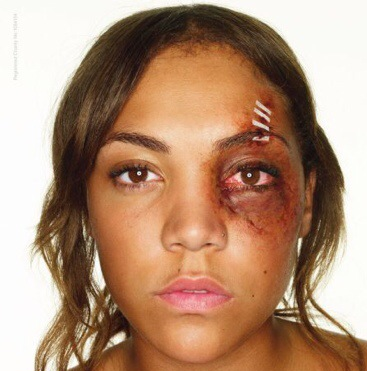Last week TMZ leaked the grainy elevator footage from last February, depicting the now-cut Baltimore Raven’s running back, Ray Rice, brutally assaulting and knocking unconscious his then-fiancé, Janay Palmer. Inexplicably, the two married only a month later. Furthermore, now-wife Janay Rice has since apologized for her “role in the night” and expressed her horror at the release of the video. Instead of receiving help and support, she’s faced endless online backlash—which means it’s time we had a proper discussion on abuse culture in America.
First off, let’s address the blame game. When the incident was first reported there was obviously a ton of criticism aimed at Mr. Rice and the NFL’s decision to only suspend him for two games. Sadly but unsurprisingly, there were also reporters asking what Palmer’s part must have been in the incident. Had she provoked him? Did she hit Rice, a man three times her size, first—thus deserving retaliation? Wasn’t she just asking for it?
If you’ve ever listened to more than 12 seconds of Fox News coverage on any form of sexual assault, you know to expect these ignorant, debasing and critically damaging questions. Rape culture and abuse culture are intimately rooted in the same issue:
We treat female victims as co-conspirators in their own mistreatment.

Via: kingsmenmedia.com
ESPN’s own Stephen A. Smith went on the air to tell women not to do anything to “provoke” action against them. To be perfectly clear, victims of domestic or sexual assault are never contributors to their own abuse. Yet somehow, we continue to hear the mansplainers of the world uniting their dogmatic voices to tell women the solution to all their problems: don’t get hit, don’t get raped, leave, prevent, evade.
When her marriage to Ray Rice was announced, some of the Janay’s supporters were shocked and appalled. Suddenly she had dug her own grave and deserved to be lying in it. They asked why she hadn’t walked away, why she would CHOOSE to put herself at continual risk for abuse. The hosts of “Fox & Friends” even giggled and made a joke about Janay’s decision to marry Rice, advising the man to “take the stairs” next time he decides to beat his wife in order to avoid being recorded. Unacceptable. This expectation of escape we put on victims is just another way our culture misunderstands domestic abuse.
A near-universal characteristic of interpersonal abuse is the psychological and emotional entrapment of the victim. This reality of cyclical abuse can seem inescapable from the inside. The tag #WhyIStayed started trending on Twitter last week to give some insight into why victims stay in abusive relationships. Survivors explained their feelings of worthlessness, of isolation, and sometimes of the false hope that their abusers would change. Others shared the stories of their breaking points, tagging #WhyILeft to highlight the necessary revelations it took to seek out help and protection.

Via: WordPress
The point is, victims cannot and should not be expected to prevent their own assaults. It is the assaulters and they alone that bear the responsibility of circumventing violent sexual and domestic crimes. Women like Janay Rice need understanding and empathy, not empty judgment or scorn.
Chris Brown, a star infamous for his own abusive past with ex-girlfriend Rihanna, is working to lead the conversation in a positive direction. In an interview with MTV’s Sway Calloway last week, the rapper had some words of advice for Ray Rice or anyone else in a similar position: “Every situation is different, but it’s all about the choices you make and how you control your anger.” Not once in his interview did Brown try to place the blame anywhere other than on himself. He spoke candidly about his ongoing anger management and therapy, encouraging others to seek out help in order to keep from losing control.
It is a rare and welcome sight to see such a prominent Hip-Hop industry figure working to end the stigma on therapy and take responsibility for his own abuse.

Via: singleblackmale.org
Lastly, we need to discuss the leaking of the video itself.
On one hand, it underlines the NFL’s pathetic attempts at damage control. A two-game suspension followed the indictment of Mr. Rice, a horrifyingly disappointing reaction to the charge of aggravated assault. Fellow teammates and the heads of the Ravens had praised Rice’s progress and cooperation with authorities. For months his actions were seen as redeemable, despite the known brutality emphasized in the written reports. Almost immediately after the leak of the video, however, Rice was cut from the Ravens and suspended indefinitely from playing in the NFL.
NFL officials claimed not to have known the truth of the incident until seeing the video for the first time this past Monday, but the Associated Press claims law enforcement sent them the obtained footage back in April. It would seem that the NFL did know the severity of the assault, but was hoping to avoid cutting the running back. Only after realizing the inevitability of public backlash did they decide to take any proportionate action.
On the other hand, however, this leak epitomizes the lack of respect our society has for consent. Janay Rice, the woman who is brutalized and dragged around unconscious by her assaulter in the footage, did not consent to the video’s release. She has publicly criticized media outlets for sharing her most vulnerable moment, as well as shaming her family and putting her husband’s career at risk. Whether or not you think Janay’s mindset is in the right place when making the last statement, it’s hard to argue with the fact that she deserves some say in the widespread consumption of her own abuse.

Via: media1break.com
Does the video leak provide an important conversation starter for abuse culture around the world? Undoubtedly. Will it inspire other women in similar situations to seek help or even stop potential abusers from resorting to assault? Perhaps. Are we wrong is continuing to watch, share and discuss these moments of deeply personal and intimate abuse? It’s hard to say.
For anyone looking for resources to help them escape interpersonal violence, check out this life-saving smartphone app, ASPIRE, or call the National Domestic Violence Hotline at 800-799-SAFE (7233).
Featured photo courtesy of: ning.com





